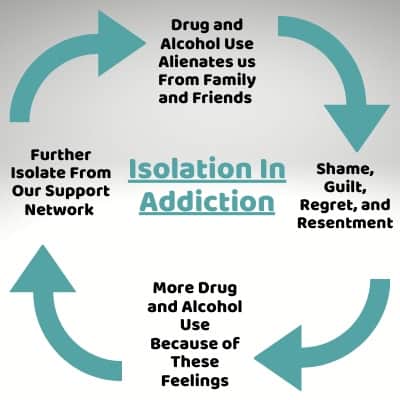Isolation… I am the king of isolating. It’s kind of ironic. I’m a very outgoing person. I prefer to be with people, out and about, yet I can be a master Isolator. Why is this? Why is it that when I actually need help is when I want to isolate. This is a common feeling among addicts in active addiction or in recovery. But Why?
Many addicts and alcoholics are very good at isolating. Over the years of our drinking and drugging we slowly, or sometimes quickly, pushed away all our friends and family. The consequence of this is a more isolated existence, yet one we chose by pushing everyone out of our lives. The troubling part is at this low point when we have succeeded in pushing all of our support out of our lives is when we need them the most. Many of us ended up sitting in a dark room drinking and drugging by ourselves. I know I sure did.
Why Do Addicts Isolate Themselves?
In most cases, the progression of isolation for a person in active addiction is not intentional. Most addicts don’t wake up one day and say “I want to cut my family and friends out of my life”. This isolation happens over a continued period of drug and alcohol use. Over the course of the addiction, the addict will continue to push their support further and further away. One day they will look back and see they’ve successfully isolated themselves from all the positive influences in their lives. In certain circumstances, it’s the addict who retreats from others. At the same time, many of the addict’s family and friends are starting to cut the addict out of their lives. This combination can and will leave an addict feeling lonely, depressed, and cut off from the world.
The cycle starts by alienating oneself from family and friends by excessive drug and alcohol use. Then the addict will feel guilt, shame, regret, and resentment for pushing their support away. These negative feelings will lead to continued drug and alcohol use to escape and cope with those negative feelings. In many cases, addicts will lie, steal, and manipulate family and friends for drug money. The addict’s support will get sick of this and cut them off. This will lead to more drug use, more negative feelings, and further isolation from the world.

When an addict isolates from their loved one’s its a way of them creating a barrier or wall. The addict’s brain is screaming at them 24/7 to find more drugs. They know every time they’re with their family or friends, they’re gonna be asked questions about their drug use, maybe get into arguments or fights. To avoid this the addict decides to simply not talk to those people as much. This sounds terrible and cold, but it’s their brain telling them they need drugs all day every day to survive and anything that comes in the way of that should be cut out.

The Progression of Isolation
Loved ones of a person struggling with addiction will almost always try everything in their power to help the addict. Offer support, stage an intervention, send them to rehab, or maybe enable them with money. With each increasing episode of the drama, chaos, and drug use, more and more loved ones will start to back away and cut the addict out of their lives. Everyone has a breaking point.
Some members of my family and friends were done after I lied the first few times. Others tried and tried again to fix me and finally after being lied to 100’s of times they had enough and cut me off. Every time I lied or stole from someone close to me I felt extreme feelings of shame, guilt, and regret. These feelings didn’t stop me from continuing to do it, but I still felt bad.
After doing these horrible things to the people closest to me and feeling like crap, the only way I knew how to get rid of those feelings was more drugs and alcohol. This is how the cycle continues to perpetuate itself.
What To Do If An Addict Is Isolating Themselves?
The sad reality that can be very hard for many people to hear is that NO ONE – no one on the planet can get an addict sober until that person wants to get sober. With that being said you can still let the person know you love them and if and when they are ready to change you will support them. Many family members can do this but still keep strict boundaries set up so the addict doesn’t bring chaos into their lives again and again.
There are multiple support groups set up for family and friends of addicts such as Al-Anon and Nar-Anon. These groups will help teach people how to set up and maintain healthy 
boundaries. Sometimes just connecting with others going through the same struggles can help you seek and find new methods of coping with the pain of seeing a loved one in isolation mode.
Set up strict rules and boundaries around when and where you will meet the addict. You need to understand that if you invite someone in active addiction to your home, there is a good chance that person is going to bring drama and chaos with them. Meet them at a coffee shop if you don’t want them in your home.
What To Do If You’re The One Isolating?
The first and most important thing any person can do if they’re in deep isolation caused by addiction is to get help for their drinking or drug use. Putting down the substances is an essential first step. Us addicts have a hard time asking for help. We need to learn to step out of our world of isolation and ask others for help. If someone offers to take you somewhere or go do a fun activity, as much as it may sound boring, it will help. Get out, socialize, be with people, talk with people, and start to see the world again.
Mandatory or voluntary support groups can be a huge help to break the cycle of isolation. When I was in early sobriety, parole mandated me to go to outpatient rehab. This was 3 times a week for 90 minutes. I would always complain about being forced to go, but as soon as I got there I would feel better and start connecting with others in recovery. 12-step meetings are another great way to break isolation. When I go to AA meetings the people there have been through similar situations as me and can relate to what I’m feeling. That feeling of loneliness disappears as soon as I walk into an AA or NA Meeting.
Coming out of the shell of isolation is not an easy task. We have become accustomed to saying No to everything. Being alone is our new normal at this point. The first few times you leave this lonely world and venture out with someone, you will feel weird and uncomfortable. This is OK and totally normal. We grow when we feel uncomfortable.
Many addicts have spent years making excuses for anything they are invited to if they are still invited at all. Breaking this habit will take time and practice. The key to breaking isolation is action, not words. Just start doing.
Isolation During Recovery

I believe many humans in general will isolate themselves when they feel uncomfortable or out of place. This can be a very common feeling for people in recovery. We did so much damage in the past that we feel we don’t deserve sobriety and the good changes happening in our lives.
It might be a month into recovery or a year but many of us addicts fall back into this isolation mode at some point. Isolating has become something we were so used to for so many years that we will almost inevitably fall back at some point unless we work on a daily basis to fight it.
Reaching Out For Help
Now being in recovery I have to work daily to not follow those same habits. I know I’m not pushing away friends and family intentionally by my drug use, but I can still be guarded and put that wall up.
When someone tries to enter that comfort zone and get close, my immediate instinct is to drop the curtain on them and retreat. Whoa whoa whoa… you’re too close, back up. No one is getting into the inner Kyle. This is an instinct I honed throughout my addiction and in prison. But life is not prison. I have to learn to put that guard down.
Staying sober on a daily basis is something I can’t do alone. I believe most addicts would agree. Having a solid support network is key to a healthy recovery. It doesn’t matter how good my support network is if I don’t tell them when I’m struggling, they will never know. In my opinion, the most important skill anyone in recovery can learn is how to ASK FOR HELP.
Asking for help or telling others when we aren’t doing good is essential. Our support network will stay with us, guide us, and help get us through tough times. Specifically when real rough situations come up in our lives. When we get sober the world doesn’t stop. We still have bills to pay, loved ones to take care of, emotions to deal with, and deaths.
Letting People Inside That Comfort Zone
I know for this addict I have to risk being hurt but let people in. I know that some will hurt me but more will not. If I let 20 people in close over the next 5 years, 4 may hurt me, yes, but the other 16 may blossom into some of the best relationships of my life. It might be my best friend for years to come. Or maybe a future girlfriend or wife. But the key is I won’t know if I don’t try and open up for the risk.
When I isolate I ensure that I will never experience the best relationships life has to offer. More important than that to me is sobriety. When I isolate I ensure I won’t ask for help when I need it. Isolation is a killer. I experienced too much isolation already in my life and now I’m committing to not live that way.
Articles
A common question many people in recovery from drugs get asked is "Why can't you have a drink?" or "If alcohol wasn't your drug of choice why can't you drink?". Everyone has their own path in...
A person in active addiction will do things that cross their own moral boundaries. On the inside, they will feel guilty and ashamed of what they are doing but the pull of addiction and the crippling...


